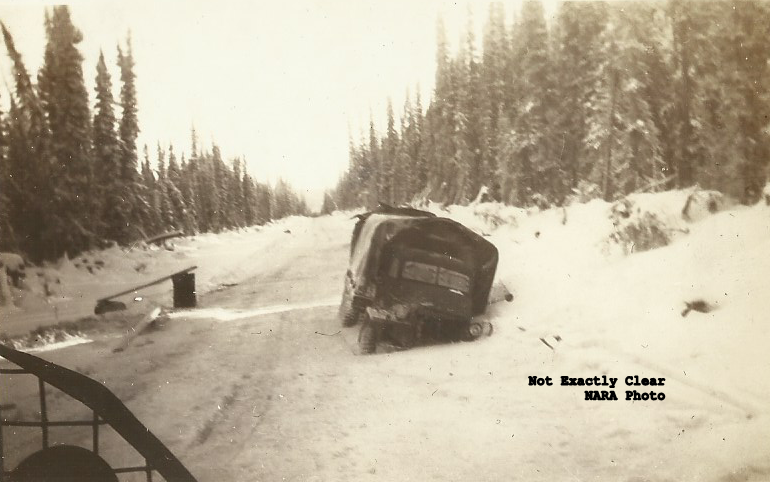
Winter, 1942-43, a winter natives and old timers in Alaska and Northern Canada remembered as the worst since 1917, found Sergeant Heard and his men enduring at Northway, near the Canadian border. Temperatures reached 72 degrees below zero and the white officers of Company F abandoned their frigid quarters for days at a time, crowding into a root cellar.
The Squad led by Sergeant Heard
Sergeant Heard and his ten men huddled, like most of the men in the regiment, around stoves in tents, turning like roasts on a spit to warm their cold sides.

Their threadbare uniforms offered little warmth. Some men had only half of a sleeping bag. Some lacked parkas. They swapped and shared clothes, blankets and sleeping bags, desperately trying to stay warm.
They took turns going outside, cutting frozen tree trunks into firewood. They watched each other carefully, examining faces, noses and ear lobes for tell-tale signs of frost bite.
Heard and his men worked all winter, doing their best to keep the new Alaska Highway clear of snow and ice, especially the huge mounds of “mushroom ice” that grew around the ends of bridges and culverts. But snow and ice piled up and equipment broke down. By mid-January 1943 the regiment had all but exhausted its supplies of food, fuel and spare parts.

As winter approached its end, the regiment needed a Supply Office up in Fairbanks. At Big Gerstle, 130 miles from Fairbanks, Headquarters and Service Company Commander Lt. Dewitt C. Howell ordered his young assistant, Lt. Robert.W. Lyon, to move some men and material up there and establish one. Lyon would need soldiers and Howell asked Company F to loan him a squad to go with Lyon.
In March, Company F loaned Sergeant Heard and his nine men to Howell. The weather had eased a bit. The temperature had climbed to a balmy twenty degrees. Even at that, the soldiers endured a miserable two-day convoy to Big Gerstle.
A Map of the Gerstle River Region
In Alaska, of course, winter doesn’t end in March. Heard and his men reported to Howell’s company on March 12—just ahead of another spell of bone crunching cold.
Thank you for another interesting read. Love this kind of Canadian history.